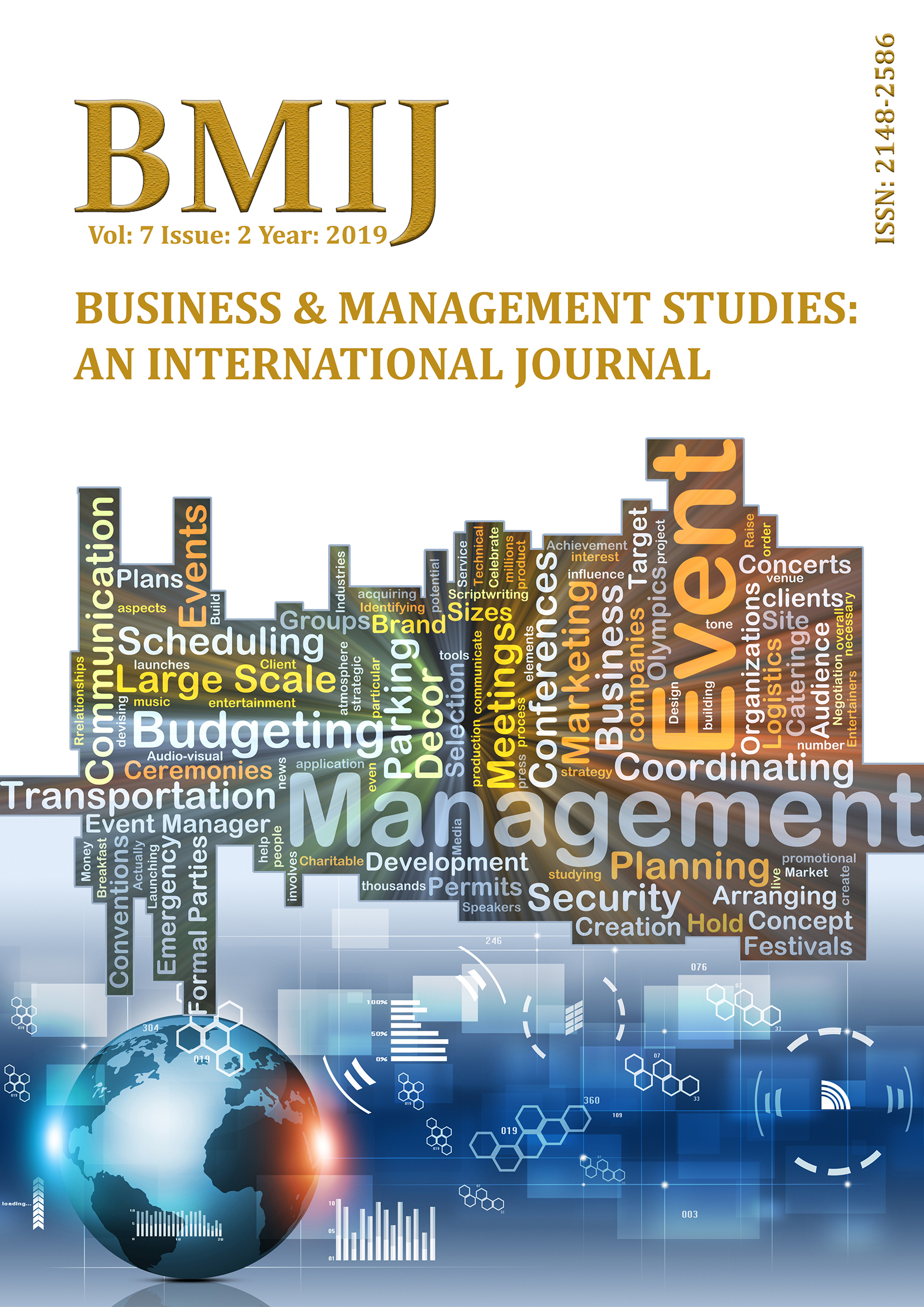MUHASEBE ÖĞRETİM ELEMANLARININ İLGİ ALANLARINA İLİŞKİN VERİ MADENCİLİĞİNE DAYALI BİR ENVANTER ÇALIŞMASI: TÜRKİYE YÜKSEKÖĞRETİM SİSTEMİNDE BİR ARAŞTIRMA

Yayınlanmış 26.06.2019
Anahtar Kelimeler
- Accounting Education, Sub-interests of Accounting, Higher Education
- Muhasebe Eğitimi, Muhasebe Alt İlgi Alanları, Yükseköğretim
Nasıl Atıf Yapılır
Nasıl Atıf Yapılır
Öz
Son yıllarda işletme dünyasında, iş yapma biçimleri ve işlem türleri açısından önemli bir dönüşüm süreci yaşanmaktadır. Üniversitelerde verilen muhasebe eğitimi, ilgi alanları itibarıyla yaşanan bu dönüşüme uyum sağlayabildiği ölçüde niteliğini yükseltecektir. Muhasebe öğretim elemanları ilgi alanları temelinde yapacakları bilimsel yayınlarla, muhasebenin işletme dünyasında yaşanan dönüşüme intibakında stratejik bir rol üstlenmektedir. Bu çalışmanın amacı yükseköğretim düzeyinde görev yapan muhasebe öğretim elemanlarının alt ilgi alanlarını saptamaktır. Araştırmanın verileri Yükseköğretim Kurulunun resmi internet sitesinden temin edilmiş olup 658 öğretim elemanının alt ilgi alanlarına ulaşılmıştır. Akademisyenlerin alt ilgi alanlarına ilişkin olarak oluşturulan veri havuzu üzerinde veri madenciliği uygulamaları ve frekans analizleri gerçekleştirilmiştir. Sonuç olarak öğretim elemanlarının finansal muhasebe, maliyet ve yönetim muhasebesi, denetim ve mali tablo analizi gibi muhasebenin köklü alanlarına görece daha yoğun ilgi gösterdikleri, diğer alt ilgi alanlarına olan ilgilerinin ise çok zayıf olduğu saptanmıştır.
Referanslar
- Sayılı İktisadi ve Ticari İlimler Akademileri Kadro Kanunu (1977, 17 Ağustos), Resmi Gazete Sayısı: 16030.
- Sayılı Trabzon İktisadi ve Ticari İlimler Akademisinin Açılışı ve Bu Eğitim Kuruluşunun Kadro Kanunu (1978, 20 Haziran), Resmi Gazete Sayısı: 16331.
- Dinç, E. ve Atasel, O. Y. (2016). Türkiye’deki Muhasebe Anlayışının Gelişim Süreci ve Mevcut Durumun İncelenmesi. Karadeniz Teknik Üniversitesi Sosyal Bilimler Enstitüsü Dergisi, 6(12), 267-283.
- Gökçen, G., Ataman, B., Cebeci, Y. ve Cavlak, H. (2015). Türkiye’deki Devlet Üniversitelerinin Lisans Programlarındaki Muhasebe Standartları Eğitimi Üzerine Bir Araştırma, Marmara Üniversitesi Öneri Dergisi, 11(44), 121-145.
- Gücenme Ü. ve Poroy Arsoy A. (2006). Türkiye’de Cumhuriyet Döneminde Muhasebe Eğitimi, Mali Çözüm, 76, 308-328.
- Gündüz, M. Türkiye’deki Devlet ve Vakıf Üniversitelerinin Tüm Programlarında Muhasebe, Finansal Raporlama ve Denetim Standartları Eğitimi Üzerine Bir Araştırma. Çankırı Karatekin Üniversitesi İİBF Dergisi, 8(1), 185-212.
- Güney, S. ve Kaya, A. (2018). Teknolojik Gelişmelerin Muhasebe Eğitimi Üzerinde Etkileri: Öğretim Elemanları Üzerinde Bir Uygulama. Electronic Turkish Studies, 13(14).
- Güvemli, O. ve Güvemli, B. (2006). Osmanlı’dan Cumhuriyet’e Muhasebe Düşüncesinin Gelişmesi, Mali Çözüm, 76, 275-289.
- Güvemli, O., Aytulun, A., & Şişman, B. (2013). Türkiye’de Muhasebe Mesleğinin Gelişmesi ve İlk Meslek Örgütlenmesi: Türkiye Muhasebe Uzmanları Derneği-1942. Muhasebe ve Finans Tarihi Araştırmaları Dergisi, (4), 19-49.
- Han, J., Pei, J. ve Kamber, M. (2012). Data Mining: Concepts And Techniques, Elsevier Publication.
- Harper, C. ve Dunn, Cheryl (2018). Building Better Accounting Curricula, Strategic Finance, August 2018, 46-53.
- https://akademik.yok.gov.tr Erişim Tarihi: 22.02.2019
- Madsen, P. E. (2014). Has The Quality of Accounting Education Declined?, The Accounting Review, 90(3), 1115-1147.
- Özmen, Ş. (2001), İş Hayatı Veri Madenciliği ile İstatistik Uygulamalarını Yeniden Keşfediyor, V. Ulusal Ekonometri ve İstatistik Sempozyumu, Adana.
- Öztürk, S., Topal, A. ve Kaya, Y. (2019). TRA 2 Bölgesi Akademisyenlerinin Bakış Açısıyla Adli Muhasebe Eğitimi. Muhasebe ve Finansman Dergisi, (81), 163-182.
- Rajdeepa, B. ve Nandhitha, D. (2015), “Fraud Detection in Banking Sector Using Data Mining”, International Journal of Science and Research, 4(7), 1822-1825.
- Subaşı, Ş. ve Demir, B. (2009). Fakültelerin İşletme Bölümlerinde Verilen Muhasebe Derslerinin Durum Analizi. Muhasebe ve Finansman Dergisi, (44), 127-137.
- Terzi, S., Şen, İ. K. ve Solak, B. (2013). Bologna Sürecinin Muhasebe Eğitimine Etkisi: Üniversitelerin İşletme Bölümlerinin Ders Programları Üzerine Bir İnceleme, Muhasebe ve Finansman Dergisi, (59), 83-100.
- Uyar, S. (2008). Uluslararası Eğitim Standartları (IES) ve Akdeniz Üniversitesi'nde Muhasebe Eğitimi, Muhasebe Bilim Dünyası Dergisi, 10(1), 79-107.
- Yücel, G., Altıntaş T., Adiloğlu, B., Esen, Ö. ve Sakin, T. (2018). Muhasebede Elli Yıl İstanbul Üniversitesi İşletme Fakültesinin 50. Yılında Muhasebe Enstitüsü ve Muhasebe Anabilim Dalı, Muhasebe Enstitüsü Yayın No: 78, İstanbul.
- Yükseköğretim Kurulu (2017). Marmara Üniversitesi Kurumsal Geri Bildirim Raporu, Ankara.
- Zaif, F., Karapınar, A. ve Yangın Eksi, G. (2017). A Comparative Study on The Effectiveness of English-Medium and Turkish-Medium Accounting Education: Gazi University Case, Journal of Education for Business, 92(2), 73-80.



